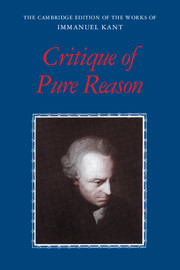Book contents
- Frontmatter
- Contents
- General editors' preface
- Acknowledgments
- Introduction
- Immanuel Kant, Critique of Pure Reason
- Table of Contents
- Motto (added in the second edition)
- Dedication
- Preface (to the first edition)
- Preface to the second edition
- Table of Contents (as in the first edition)
- Introduction (as in the first edition)
- Introduction (as in the second edition)
- I Transcendental doctrine of elements
- Division two. Transcendental dialectic
- II Transcendental doctrine of method
- Editorial Notes
- Glossary
- Index
Preface (to the first edition)
from Immanuel Kant, Critique of Pure Reason
- Frontmatter
- Contents
- General editors' preface
- Acknowledgments
- Introduction
- Immanuel Kant, Critique of Pure Reason
- Table of Contents
- Motto (added in the second edition)
- Dedication
- Preface (to the first edition)
- Preface to the second edition
- Table of Contents (as in the first edition)
- Introduction (as in the first edition)
- Introduction (as in the second edition)
- I Transcendental doctrine of elements
- Division two. Transcendental dialectic
- II Transcendental doctrine of method
- Editorial Notes
- Glossary
- Index
Summary
Human reason has the peculiar fate in one species of its cognitions that it is burdened with questions which it cannot dismiss, since they are given to it as problems by the nature of reason itself, but which it also cannot answer, since they transcend every capacity of human reason.
Reason falls into this perplexity through no fault of its own. It begins from principles whose use is unavoidable in the course of experience and at the same time sufficiently warranted by it. With these principles it rises (as its nature also requires) ever higher, to more remote conditions. But since it becomes aware in this way that its business must always remain incomplete because the questions never cease, reason sees itself necessitated to take refuge in principles that overstep all possible use in experience, and yet seem so unsuspicious that even ordinary common sense agrees with them. But it thereby falls into obscurity and contradictions, from which it can indeed surmise that it must somewhere be proceeding on the ground of hidden errors; but it cannot discover them, for the principles on which it is proceeding, since they surpass the bounds of all experience, no longer recognize any touchstone of experience. The battlefield of these endless controversies is called metaphysics.
- Type
- Chapter
- Information
- Critique of Pure Reason , pp. 99 - 105Publisher: Cambridge University PressPrint publication year: 1998
- 1
- Cited by

